Sometimes new couples feel such a rush of excitement that they mistake immense attraction and chemistry for love and compatibility.
They strongly believe that they’ve met their one and only soulmate and that their long-awaited search is finally over.
But, unfortunately, such couples don’t know that there is no one and only soulmate and that there’s a huge difference between love and infatuation.
Most new couples I converse with only seem to talk about the initial attraction – the infatuation.
They say things like, “We have a really good connection and we get along really well. Things are great between us. We’re meant for each other.“
But when I check up on these couples a few months later to see how they’re doing, their attitude and thoughts about each other appear completely different. They no longer talk about how great their relationship is and how compatible they are.
That’s a matter of the past.
They instead talk about the problems they deal with on a daily/weekly basis and the difficulties that they still have to work through.
That’s when that perfect infatuated image of their relationship that they’ve put in my head quickly turns into a much more realistic image.
It turns into a genuine representation of personality clashes and long-term relationship struggles and incompatibilities.
You see, the biggest mistake new couples make is that they put their hopes and dreams on honeymoon emotions and think that a happy start of a relationship means a happy ending.
Needless to say, it oftentimes means exactly the opposite as couples who have a fairytale-like start only believe that their relationship is perfect.
They think that because they:
- Have only been together for a short while and haven’t gotten to know each other very well yet.
- Focus on each other’s good points and neglect most differences.
- Feel powerful emotions of desirability and consequently, think that their relationship is going to take care of itself without any willpower and conscious effort.
Such emotion-driven couples usually do really well at first. They promise each other big things and appear to be all over each other.
But when the initial infatuation of a new relationship subsides and they stop feeling elated, these couples soon change for the worse.
They drop their guards around each other, stop pretending to be someone they’re not, and find themselves in a self-destructive loop that they can’t break free from.
Consequently, they continue to react to the way they make each other feel.
Sometimes they react well and other times, they react poorly. But eventually (in almost all cases), they lose the attraction for each other because the many ups and downs shake up the relationship and destroy the trust within the relationship.
Today, we’re going to dissect the difference between love and infatuation. If you’re in a relationship and you can’t tell whether you love your boyfriend or girlfriend, pay close attention to this article. We’re going to compare infatuation to real love and help you realize what kind of attraction you have with your partner.
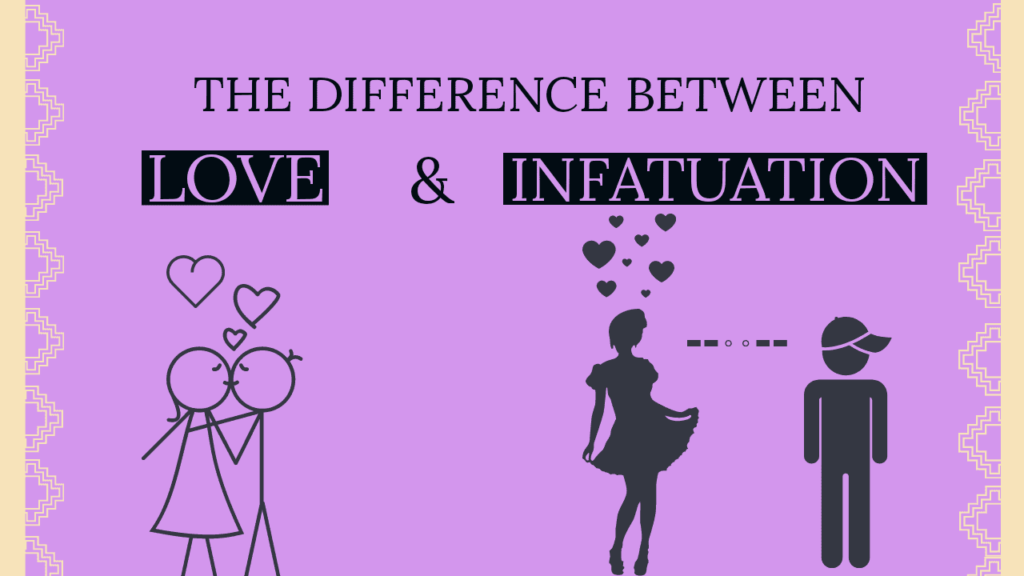

What’s the difference between love and infatuation?
The difference between love and infatuation is very easy to spot. If you’re merely infatuated with someone, you’re going to feel extremely elated to be around him.
You’re going to feel desired and validated—and see only the most positive aspects of your relationship. Anything that isn’t positive, you will usually neglect or underestimate.
If you’re in love, on the other hand, you likely won’t feel remarkably excited to be with your partner. At least not over the top. Your initial excitement will have waned, leaving you with more subtle feelings of joy, adoration, and mutual understanding.
Unlike infatuation that occurs almost instantaneously, love will take you many months to develop. On top of that, it will take many positive experiences as well as some kind of mutual long-term plan or a shared vision.
This is why love is more than just a feeling of attraction.
Love is also rational, meaning that without positive thinking and continuous love affirmations/reminders to stay committed, love can’t last forever. It ends the moment people take it for granted and treat it as if it’s merely an emotion that’s either there or not there.
Fortunately, love doesn’t depend on itself or on external factors for existence. It doesn’t depend on the quality of your health or job either (although that can affect it if you’re not aware of your thoughts and feelings).
Love depends on the way you choose to act, react, and perceive your partner. In simpler terms, it all comes down to the kind of thoughts you generate throughout each and every day.
If your thoughts are happy, you generally feel happy. If they’re bad thoughts, you feel bad emotions and most likely act on your unhappiness too.
And if your thoughts are just so-so, then that’s how you feel toward your partner as well. Just so-so.
You need to remember that your relationship cannot succeed or continue to remain successful without a healthy relationship mentality.
It actually requires two healthy relationship mentalities otherwise your love (which is a mutual feeling) ends up severely unbalanced and unrequited.
So make sure to always keep a positive relationship mentality, and with it, a positive attitude. Your relationship depends on it.
Are new couples in love or infatuated with each other?
When we see a new couple who is fresh in love, we normally say that they’re in love, love-struck, head over heels in love, lovesick, lovey-dovey, and so on…
But the truth is that they’re anything but in love. They’re merely infatuated with each other and don’t yet feel the emotion (love) that binds them together long-term.
All new couples feel are the famous four love/happy hormones (endorphins, serotonin, dopamine, oxytocin) which promote their love, attraction, pleasure, and other positive feelings of mutual desirability.
On that note, new couples may say they love each other and appear that way to others, but they most certainly don’t love-love each other yet.
Provided that they stay together long enough to get to know each other and overcome their differences, misunderstandings, problems, and shortcomings, they can, of course, fall in love and stay in love.
But before they get to that love stage, they aren’t in love yet. They’re still in the process of developing the thoughts and feelings that connect them to each other long-term.
As we said before, real love takes months to develop. And couples who are head over heels in love with each other necessarily need those months of time to stop feeling elated.
With the help of time, they can properly test their relationship for love and willpower – and not get mislead by their infatuated emotions.
How to tell the difference between love and infatuation?
To see the difference between love and infatuation, examine the intensity of your feelings for your partner.
Dig deep and discern whether your attraction for your partner is emotional or rational.
If it’s leaning toward the emotional end of the scale and you feel immensely pulled toward your partner, you’re probably infatuated with your partner and the newness of your relationship.
You’re extremely excited to love and to feel loved.
Of course, there’s also a chance that you’re more than just infatuated with your boyfriend or girlfriend and that you desire your partner’s love and recognition because you don’t feel infatuated with yourself enough.
If that’s the case, it’s possible that you’re projecting your lack of self-love onto your partner—and for that reason, think that you’re in love with him or her when in reality, you could just crave your partner’s love to compensate for your poor self-love.
You could be codependent, so consider that a possibility as well.
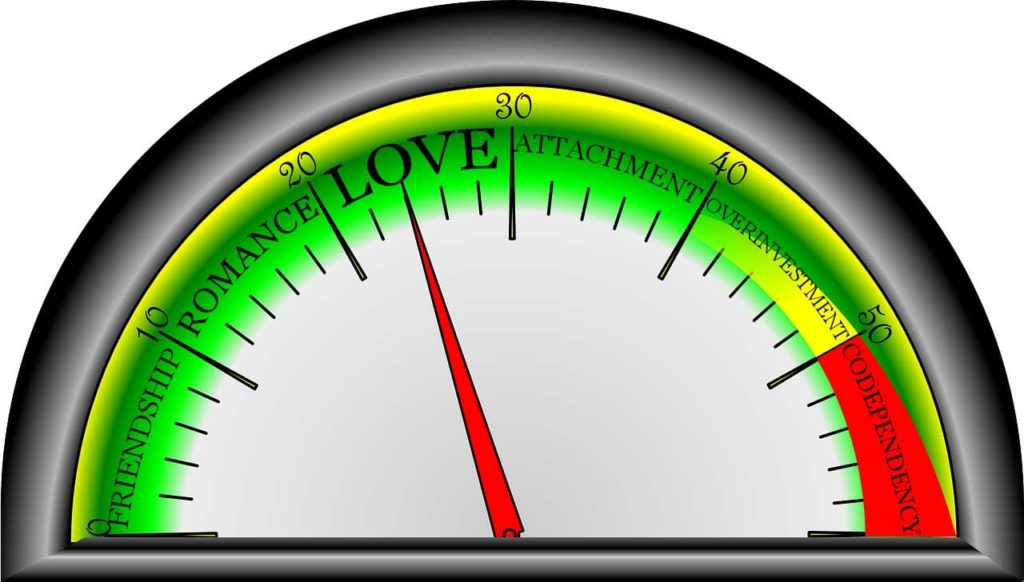

To tell whether you’re infatuated with a person or in love with him or her, examine your obsessiveness and possessiveness with that person.
Figure out whether your partner is the main attraction of your life and discern if you spend every waking moment thinking about your partner.
If you puzzle out that your partner relentlessly occupies your mind with pleasant thoughts and emotions, you’re most likely infatuated with him or her.
You desire your partner’s affection because you’re still in the early stages of a new relationship.
However, if you’re not/no longer infatuated and you’re instead in love with your partner, then you probably don’t feel ecstatic at the thought of conversing with your partner.
You feel grateful to be with your partner and feel happy to receive his or her love, but you don’t get flooded with euphoria anymore.
You feel valued, whereas if you were infatuated, you’d feel desired.
Although the infatuation phase is important for couples to fall in love, it’s also very important for couples to ask important relationship questions.
Questions that reveal how people think and act under difficult circumstances that may arise in the stage that follows the infatuation stage.
It’s so important that new couples explore each other’s wants, needs, flaws, insecurities, and shortcomings. By doing so, they can discern whether they want the same out of the relationship and foresee some of the challenges that they may face when they fall in love.
Below is a side by side comparison of the differences between love and infatuation. Feel free to compare your love to your partner.
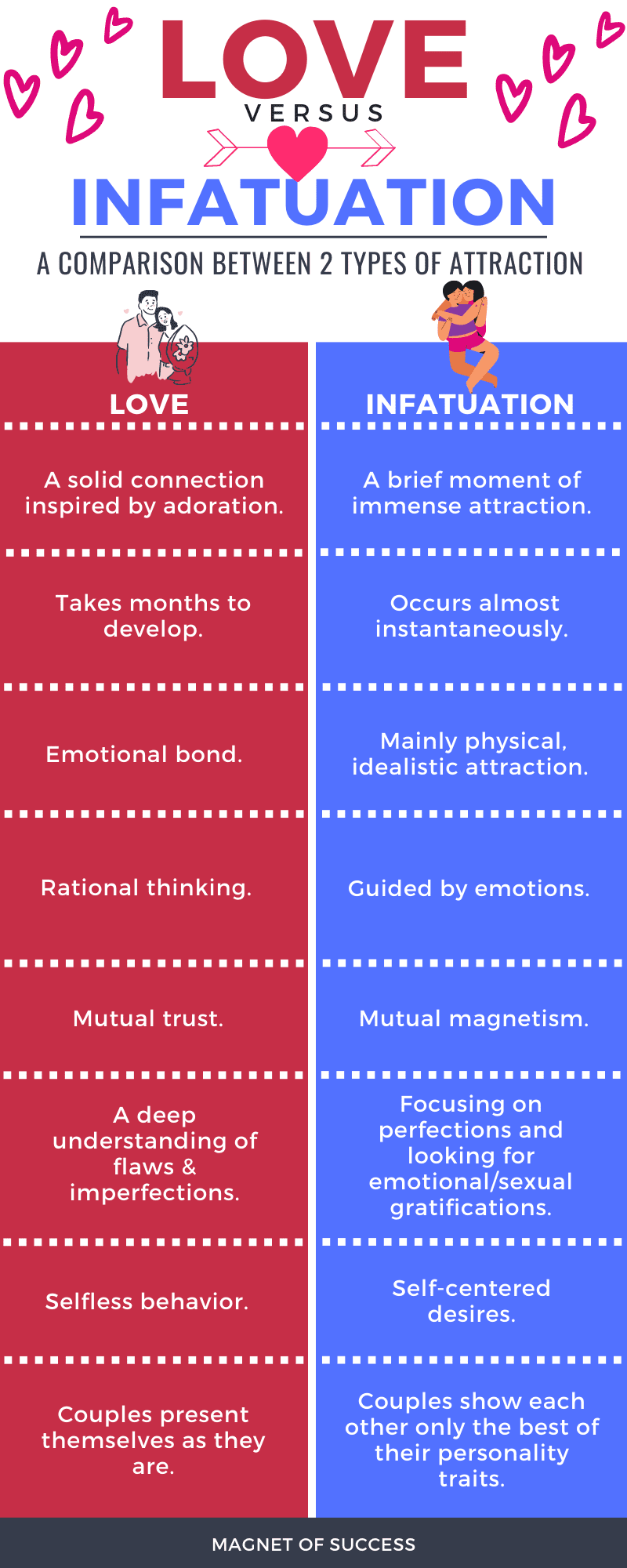

Love vs infatuation
When you’re infatuated with someone, you feel like you’re on cloud nine. You feel pulled toward your partner and admire his or her attractive traits.
Some of these traits include confidence, self-esteem, physical attraction, and the way your partner’s behavior makes you feel.
But as you can tell, these traits are all positive traits and may not accurately represent a person’s deep-rooted personality. They’re merely traits that are on display for the public to see.
This means that people aren’t always as perfect as they present themselves to be.
In the infatuation phase, people merely appear that way to us because we haven’t seen their imperfections yet. We’ve only seen their positives, which is why we don’t know what’s in store for us yet.
In love, however, things are much different. We spend enough time with our partner to see our partner’s flaws and weaknesses. And once we’ve seen them, we accept them and show our partner that it’s okay to be flawed.
Love, after all, is about accepting our partner’s imperfections and about loving our partner as he or she is.
This, of course, doesn’t mean that we should put up with unhealthy, toxic behavior. Far from it. All acceptance in a long-term relationship means is that we become okay with our partner’s differences and that we love our partner in good and bad.
Love doesn’t have to be unconditional as some naive people want it to be. In my opinion, nobody should put up with betrayal, lies, and dishonesty. That’s not what a healthy relationship is.
Love should know limits. Especially when it comes to abuse and ill-treatment.
But when we’re talking about a perfectly healthy relationship, people in relationships should do something to keep it healthy.
They should continuously remind themselves why they love the person they’re with and always remember that love is not just a desire or a longing.
It’s also a burning sensation of mutual understanding and acceptance—and an immensely strong feeling of willpower, durable enough to deal with the negative aspects of the relationship.
These negative aspects include bad behavioral patterns, insecurities and trust issues, occasional mistakes, and, of course, shortcomings.
The main difference between love and infatuation is that love is a combination of physical and emotional attraction, whereas infatuation is more about the physical presence and the emotions you feel as a result of something your partner says or does.
In other words, infatuation creates strong emotions of attraction and is dependent on something that triggers it, while love is usually less noticeable and exists continuously on a conscious or subconscious level.
Most of the time, it’s the latter.
Infatuation is usually physical
When we meet a person for the first time and we feel physically attracted to him/her, we often call our attraction to that person love at first sight.
But as you know, that’s clearly not long-lasting love. It’s the kind of infatuation that is created on the spot by our intense desire for recognition and emotional reciprocation.
It may feel like love because emotions are running wild, but more often than not, infatuation occurs on a completely physical/superficial level and has very little to do with a person’s personality.
A person’s attitude, intelligence, and the way he or she presents himself or herself could, of course, contribute to the feelings you feel for that person, but in essence, when you’re falling in love with someone, you’re still falling in love with the best of the best of that person’s characteristics.
To meet his or her real personality and core values, you’d need more time. You’d need so much time that this man or woman naturally drops his/her guard around you and shows you what he or she is truly made of.
Normally, real personality traits become evident to us when our crush gets used to us and shows us how he or she behaves under difficult/stressful situations.
That’s when our relationship starts to experience various difficulties and goes through the make it or break it relationship trial.
This trial usually awaits new couples 4-6 months into the relationship when they get past the honeymoon phase.
But sometimes, it can occur even sooner.
The honeymoon phase is the infatuation phase
When a couple falls madly in love, they feel immensely infatuated with each other’s idealized persona.
They fall in love with the person they perceive and want their partner to be—and not necessarily with who their partner actually is.
The phrase “Love is blind,” therefore couldn’t be more true as it asserts that couples in love don’t think logically with their brain. They think with their heart as they make emotional decisions—and oftentimes act on impulse.
A big part of new couples’ attraction is unfortunately idealistic and physical because couples grow accustomed to each other’s looks and presence.
They become addicted to the way they make each other feel and grow dependent on love hormones.
This infatuation phase, also known as the honeymoon phase of a new relationship can, therefore, have an important long-lasting effect on couples.
It can bind couples together emotionally and make them feel attached during and after this phase.
As for those couples who don’t particularly feel strong love-like emotions for their partner during the infatuation stage, let’s say because they’re in a rebound relationship or because they’re not emotionally ready yet, such people oftentimes fail to attach/stay attached to their partner.
They usually feel incapable of giving and receiving love, so they proceed by breaking up.
Please note that there are also some couples out there who don’t feel incredibly elated during the infatuation phase. They get excited at times and feel generally happy to be around each other.
But the interesting thing that separates such couples from other couples is that they don’t depend on their infatuated emotions for love and compatibility.
They prefer to invest time and effort into each other’s differences and truly get to know each other first.
Such couples normally have a slow start, but over time, grow their feelings and develop a relationship with a strong foundation built on trust, devotion, and adoration.
How can you tell if you’re in love with your boyfriend/girlfriend?
Before we talk about how to recognize real love, I’d first like to point out that it’s perfectly possible for couples to stay together even if they’re not too enthusiastic about each other.
They can stay together (and often do) even if they don’t love each other. And that’s because couples who have fallen out of love continue to stay together out of routine and comfort.
They’re so used to having each other by their side that they don’t even think about looking for love elsewhere.
Love, usually finds them on it’s own when they’re not looking for it.
Anyway, to be able to tell whether you’re in love with your boyfriend or girlfriend, discern whether you like your partner’s personality, behavioral patterns, attitude, and the way he or she contributes to your life.
If the answer is yes, then feel free to check the rational part of the questionnaire as complete. ✅
Next up is the emotional part. This part is about positive associations and general compatibility.
If you feel that your partner makes you feel happy, romantic emotions most of the time and you feel pulled toward your partner even after the infatuated stage of the relationship, mark the emotional part as complete. ✅
You’re attached to your partner because you’ve associated positive emotions with his or her persona.
Keep in mind that it’s perfectly normal not to always feel 100% connected to your partner. Especially during arguments and stressful times.
But that doesn’t mean that your love for your partner is weak or not as great as it should be.
Those who compare love to infatuation – to emotions in the present moment, oftentimes end up convincing themselves that they’re not in love—and as a result, fall out of love.
Let me reiterate that in different words.
Couples who argue in unhealthy ways and during difficult times think that they don’t love their significant other slowly attach negativity to their partner. The more often they do this, the more they self-sabotage their feelings of love and ultimately, destroy the love bond.
This is why positive thoughts are so important in a romantic relationship. They are the key to staying out of trouble and the key to staying in love.
So next time you argue with your partner, remember to think positively. Remind yourself why your partner matters to you—and do what it takes to improve/not to worsen the way he or she thinks about you and feels toward you.
Am I in love or in infatuation?
If you’re wondering whether you’re in love or in infatuation, do a quick love or infatuation quiz.
Go through the following 6 yes/no questions and discern whether your love is real or merely infatuated.
1)Has it been more than 6 months since you’ve met your partner?
2)Have you met your partner’s real or darkest personality traits yet?
3)Has the initial excitement (the butterflies)/attraction waned yet?
4)Would you describe your love for your boyfriend or girlfriend as mainly rational?
5)Are you 100% certain you want a future with this person?
6)Do you trust this person with your life?
If you answered most questions with yes, you’re likely not infatuated with this person. You’re probably in love.
Unless, of course, you’re so love-struck that you’ve sacrificed everything you have for this person. Even your personal happiness.
In that case, you’re blinded by the relationship and are at great risk of possessing and suffocating your partner.
The biggest difference between love and infatuation is that infatuation is purely a feeling of excitement and euphoria, whereas love doesn’t necessarily consist of continuous strong emotions.
Love is a feeling that happens on a subliminal level and may not always be noticeable. We tend to just know we’re in love with someone when the initial rush of feelings wanes and we feel excited to spend our time with our partner.
Can infatuation turn into love?
It’s possible for infatuation to turn into love. In fact, most serious relationships start that way.
During the infatuation stage, couples get to know each other and find out whether they’re compatible. If they are and they like where their relationship is going, they continue to bond and watch their infatuation slowly disappear.
Bear in mind that this is perfectly normal. It’s what infatuation is. Here’s Google’s definition of infatuation; “an intense but short-lived passion or admiration for someone or something.”
It doesn’t matter if you’re in a long-distance relationship or same-sex relationship. People get excited about new things, but that excitement isn’t permanent. It can’t be because people are creatures of habit.
Just how we stop feeling excited about a new car or a new house, we stop feeling elated about being with someone new. It’s in our nature as that rush of the initial excitement is meant to wane.
But if we have a healthy mentality and everything works out well, we get something even better in its stead. We get love—and we get to decide what we do with it.
Thank you for reading. I hope this article has answered the question, “What is the difference between love and infatuation.” Comment below and let us know what you think about it.

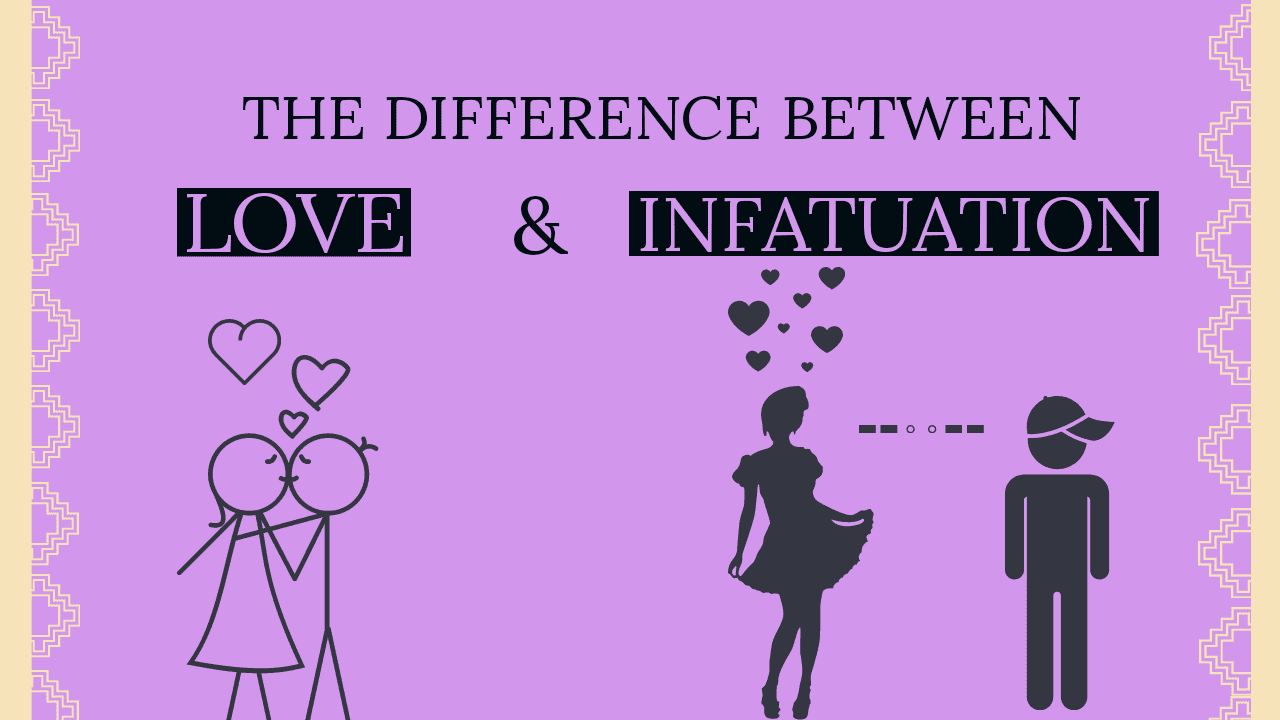
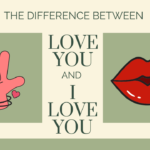
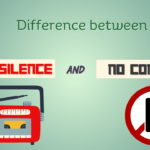
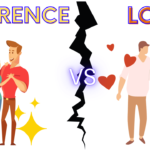
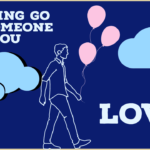
Hi Zan,
I read that the honeymoon phase usually lasts 4-6 months. Is this also the case of long distance relationship? When two people chats everyday but see each other just 4 days a month how long the infatuation phase will be?
Hi Silvia.
It varies for every person. Usually, it depends on their maturity and ability to deal with stressors and negativity. Some people get out of the infatuation stage after a month. At the 6th month mark, couples usually aren’t fully themselves, but they feel quite relaxed.
If you barely chatted, it’s possible your ex detached rather quickly. To stay infatuated, a person needs constant or frequent communication.
Sincerely,
Zan
Im told that I need to forgive my ex for what she did to me and to treat her as if she did nothing wrong.im sorry I just can’t do that,that would be saying that what she did was ok,I couldn’t have any respect for myself and she wouldn’t have respect for me either, nor would anyone that we know have respect for me for letting someone disrespect and treat me the way she did.
My partner left me after 8 years partly because he became infatuated with someone and didn’t have the maturity to distinguish between our love and his fleeting feelings for someone else. Been in no contact for a month and I so wish things could change but I feel pretty helpless.
Great article.
I think that apps such as Tinder has people confused in these modern times.
A lot of people go from infatuation to infatuation “relationships “ because they hunt that feeling and illusion of “love”.
As you mentioned… love requires both sides to invest their time and effort to make it work… and this takes maturity and self-knowledge.
It becomes a habit or an addiction to hunt those good hormones… and they are just around the corner… or the next swipe.
Thanks for the article. 💪🏼
Love from here ❤️
Thank you SCVrush.
I absolutely agree with you. A lot of people jump from one relatinship to the next, chasing highs. Such people unfortunately, almost never slow down and learn to value people for who they are.
Sincerely,
Angelie
Hello, and sorry for the wall of text, but it’s therapeutic to just get everything off my chest.
I’ve been reading this blog extensively post my first break-up after my first long-term relationship.
This place has really helped me deepen my understanding of emotions and myself, and also my ex. At first, I was devastated with the break-up because she ended it very abruptly in my own eyes, but now I realize why.
Turns out she had been infatuated with me for a long time, and when her infatuation waned, she stayed for selfish reasons, for relationship benefits basically. Meanwhile since this was my first proper relationship, after the infatuation faded a few months in, I believe it turned to love for me on a subconscious level, as we stayed together for a year and a half, where I was mostly giving and she was taking.
My love slowly faded as I didn’t want to continue doing this without getting the same in return, and she noticed it. I tried breaking up at one point, but simply couldn’t bring myself to, because I was attached to her. After all, I’ve spent a year and a half trying to get her to finish HS (she’s 19 and dropped out at 17), and get her to reduce her alcohol consumption. She drank literally every single time we’d see each other. She didn’t have a drinking problem as she’d go days without drinking at home (at least I think so, not sure anymore), but whenever we met she couldn’t even pull the gesture of not consuming alcohol for me, literally only once in 1.5y.
After me pushing her to better herself didn’t work, I gave up. I realized that had she loved me truly, she would’ve done more. She was a selfish prick, in it for her own validation.
Furthermore, she’s proven it by breaking up over a text 3 days after we’ve slept together, only because I stopped responding for a couple of days because of a high uni workload, and simply needing some time on my own, and slept with someone new the day after.
Took her 4 days to monkey-branch, and now she’s in a rebound. She never loved me for me, she was in it for validation and her lack of self-love. At first I was broken, but as time has passed, and I slowly began to observe things from a more objective stand-point, it all makes sense and is actually helping me heal faster.
I did also commit many post-breakup mistakes, because at the time I wasn’t thinking rationally and just wanted to get back together, which she of course refused since she’d already found a replacement. That’s when she told me it’s over since they already slept together, after breaking up with me over text.
From my perspective I have been cheated on, since simply taking a few days off after sleeping together didn’t mean we were through. In the end it doesn’t even matter, since she didn’t even have the decency to block me out, or wait some time until someone else came up. She never respected our relationship, and she openly showed it.
I’m actually glad I commited pretty much all of the post break-up mistakes, as I’ve most likely ensured she never talks to me again. I’m no saint, and I’ve wronged as well in our relationship, after all it’s my first and I’m still learning, I admitted my mistakes (even the things I don’t actually think were mistakes) and offered not to change, but to use everything that has happened as a lesson to make our relationship even stronger, if she accepts hers, and does the same, which she refused, because after all, she’s the victim and hasn’t done anything wrong.
She doesn’t deserve me, I go to uni, am about to finish it and get a job, a place of my own, and being the person that I am, who only sees good in people, I’d likely have given her another chance. But not anymore. She would’ve freeloaded without giving anything in return. And I’m glad she blocked me out of her life. She’s back to her same old, self-harmful lifestyle, didn’t enroll into HS this summer as well, so she’ll be 20 without HS.
I can only feel sorry for her loss, as she likely will never realize what she let slip by, had she only put in any effort at all. I wish her all well and happiness, because she will need it. She might find someone who’s fine with her having no basic education, having a drinking habit, and no motivation, who’ll only use her for sex. I really do feel bad for her.
Furthermore, she’s proven it by breaking up over a text 3 days after we’ve slept together, only because I stopped responding for a couple of days because of a high uni workload, and simply needing some time on my own, and slept with someone new the day after.
One correction here, I worded this wrong, I wanted to say that SHE slept with someone else the day after breaking up over a message, three days after me and my ex slept together.
Small correction, here I meant to say: Furthermore, she’s proven it by breaking up over a text 3 days after we’ve slept together, only because I stopped responding for a couple of days because of a high uni workload, and simply needing some time on my own, and SHE slept with someone new the day after.
Could you please delete my lastest post, I dont want my real name to be seen. Thank you
At some point I got confused between the two but now I know better. Thank you so much for this.
You’re welcome, Anna.
Thanks for the comment.
Angelie
Amazing article. Thank you for explaining the difference. I’ll learned a lot.
I hope it helps.
Best,
Angelie
Well explained! Couldn’t have done it better! 🙂
Thank you Yash!
Thanks Angelie !! Indeed love and infatuation are too hard to determine. It helps a lot! Good job!
Thank you Haze.
I hope that the article has helped you differentiate between love and infatuation.
Best wishes,
Angelie
Thank you! This article really helped me differentiate love and infatuation
I’m glad I was able to help.
Thanks for leaving a comment Kassandra!
Best regards,
Angelie
Hi Angelie
Thanks for clarification. Wish I knew the differences earlier.
My ex and I were one of the typical “new couples” when we started dating. However, once the honeymoon phase is over, he started to see the ugly side of me and realized some mismatch, told me we don’t share many interests and the conversation flow isn’t right etc., been through ups and downs and tried working things out, but ended up being broke up eventually.
Would you elaborate more what would be the condition to turn infatuation into love? Do you think the good and the bad thought toward your partner can be balanced out? Sometimes one single negative thought can overweight ten positive thoughts to collapse the whole thing.
Hi Cate.
Thanks for the comment.
Your ex was infatuated with you for as long as he felt positive emotions for you. The moment he got out of the infatuation phase and stopped feeling those powerful emotions, he no longer felt the desire to be with you. He wanted exactly the opposite – to be free and independent.
This occurred because of 1) his relationship mentality and 2) the way he perceived you as his romantic partner.
General compatibility and positive love emotions usually turn into love on its own. All it takes is two people that have the same relationship expectations and similar personal values.
I’ve read somewhere that for every bad experience a couple goes through, there must be at least 5 good ones. If it works the same way for negative thoughts, it certainly is possible that the bad outweighs the good. And that’s because bad emotions have a profound effect on the mind.
Sincerely,
Angelie
Hi Angelie
Thanks again for you thought on it. Much appreciated!
Thank you writing this. I couldn’t ask for more. Well said!
Thank you for this article! Very helpful
Thanks a lot Linda!
Nice article, really helpful 😍
Thank you, Zee.
I hope you enjoyed it!
Angelie